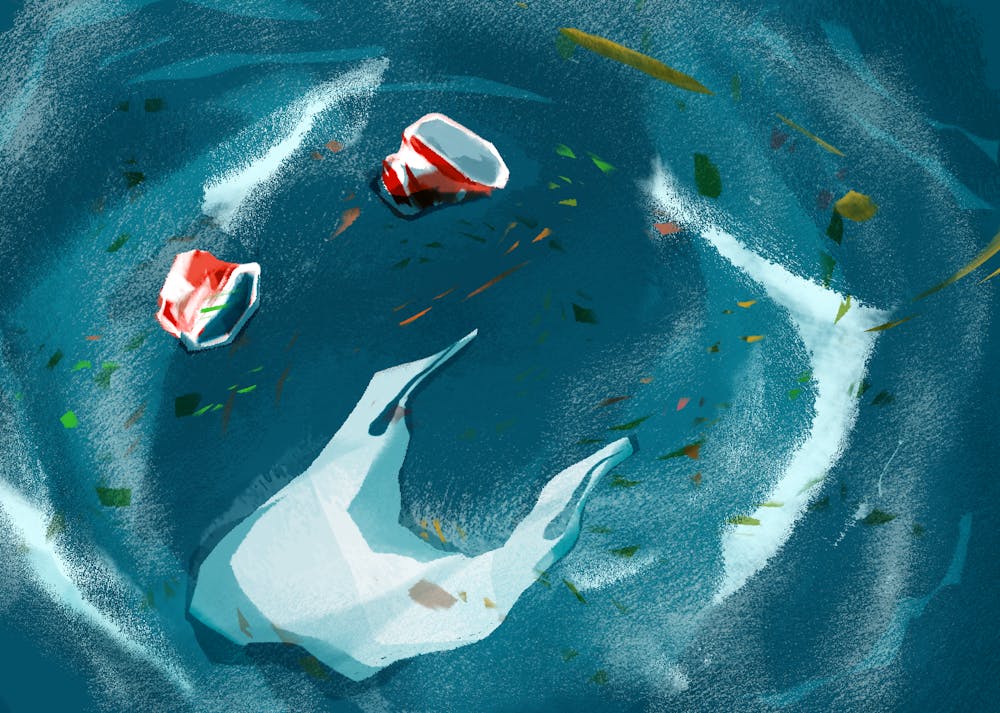Awareness of plastic pollution has increased in recent years, but some marine biologists question whether reusable straws and stainless steel water bottles should be the public's primary concern.
A study by six co-authors conducted a literature review summarizing the findings of published studies on plastic's impact on marine megafauna species. The findings from the data they analyzed were not what the media suggests.
Assistant research professor from the School for the Future of Innovation in Society and study lead Jesse Senko studies fishery bycatch, the unintentional but harmful capture of animals in fishing nets. It led him to wonder if plastic had the same impact as other issues proven to be detrimental.
"The disproportionate amount of information that the media covers with respect to the ocean is plastic, you see it everywhere," said Senko. "It's getting so much attention, but very rarely do people talk about climate change, fishery impacts, noise pollution, habitat degradation and all these other threats that we know cause population-level impact."
The study's purpose was to understand how plastic pollution affects marine megafauna on both an individual level and, more importantly, a population level.
The studies they analyzed focused on plastic entanglement or ingestion by sea birds, marine mammals or sea turtles. As they began getting more specific with the filtering, the amount of research that showed damaging or lethal effects on megafauna was surprisingly low.
"We submitted this paper the first time with around 300 studies as part of our database, but when we really focused in on population-level effects, we only chose 47 papers," said graduate student and co-author Janie Reavis.
The most significant finding was that not many studies look at population level, so it cannot clearly be associated with plastic pollution. Reavis said it's difficult to assess an entire population because it takes a lot of time and resources, so not enough species have the necessary research.
"It's not necessarily that we found that plastic is not having an effect, it's that there isn't enough information to suggest that it is," said Senko.
These discoveries inspired two questions for the researchers — does the lack of information mean that plastic does not harm sea life, or is there insufficient investigation on scientists' part? Senko believes that it is a combination of both.
"We know that plastic is killing individual animals and we were able to document that in our study," said Senko. "What becomes a really big question is whether it's killing enough animals to cause their population to decline, and we really don't know."
The authors believe the media has created an assumption that plastic causes more damage than what is proven.
“The video of a turtle with a straw up its nose or baby birds with guts full of plastic are impactful,” said co-author Bryan Wallace. “It’s really easy for somebody to look at a picture, have that evoke an emotional response and then make a connection to themselves personally.”
These findings have also shed light on numerous issues within the research world, according to Senko. Many professionals devote time to studying solutions for plastic without evidence that it's the most pressing issue.
"I've become very frustrated because this media coverage of plastic has inspired a lot of scientists to focus on it. There's an incentive to look at these questions because they're getting a lot of funding for this work since it's a sexy topic," said Senko. "I know researchers that won't publish negative findings that suggest plastic isn't causing a problem in fear of that affecting their funding."
The scientists also stress that plastic is still a pressing issue with serious chronic impacts. Their study does not suggest that plastic doesn’t cause damage to the ocean environment.
"We don't want the message of our research to be that plastic isn't a big deal, we say over and over again how pervasive plastics are and how uncertain we are about its impact," said Wallace. "Misinterpreting the data is the real danger."
The study shows a need for an immense amount of research before making a conclusion, and the authors continue pushing to achieve that with newfound help.
"Right after publishing the paper, we had a researcher send us a bunch of unpublished data that really looked promising in showing that there is a population-level impact on ships in Midway Atoll National Wildlife Refuge," said Senko. "I would love to follow it up with the first paper really documenting a strong link to plastic and how that affects the population."
Reach the reporter at amley@asu.edu and follow @MartyLey_ on Twitter.
Like The State Press on Facebook and follow @statepress on Twitter.




